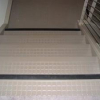Free Online Productivity Tools
i2Speak
i2Symbol
i2OCR
iTex2Img
iWeb2Print
iWeb2Shot
i2Type
iPdf2Split
iPdf2Merge
i2Bopomofo
i2Arabic
i2Style
i2Image
i2PDF
iLatex2Rtf
Sci2ools
109
Voted
CVPR
2005
IEEE
2005
IEEE
Dynamic Environment Exploration Using a Virtual White Cane
The virtual white cane is a range sensing device based on active triangulation, that can measure distances at a rate of 15 measurements/second. A blind person can use this device for sensing the environment, pointing it as if it was a flashlight. Beside measuring distances, this device can detect surface discontinuities, such as the foot of a wall, a step, or a drop-off. This is obtained by analyzing the range data collected as the user swings the device around, tracking planar patches and finding discontinuities. In this paper we briefly describe the range sensing device, and present an online surface tracking algorithm, based on a Jump-Markov model. We show experimental results proving the robustness of the tracking system in real-world conditions.
Computer Vision | CVPR 2005 | Planar Patches | Range Sensing Device | Surface Discontinuities | Surface Tracking Algorithm | Virtual White Cane |
Related Content
| Added | 12 Oct 2009 |
| Updated | 29 Oct 2009 |
| Type | Conference |
| Year | 2005 |
| Where | CVPR |
| Authors | D. Yuan, Roberto Manduchi |
Comments (0)

